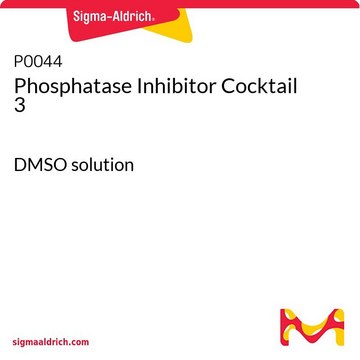535140
Protease Inhibitor Cocktail III
Animal-Free, liquid, for the inhibition of aspartic, cysteine, serine proteases and aminopeptidases
Synonyme(s) :
Animal free Protease inhibitor
About This Item
Produits recommandés
product name
Protease Inhibitor Cocktail Set III, Animal-Free, Protease Inhibitor Cocktail Set III, Animal-Free, is a cocktail of six protease inhibitors with broad specificity for the inhibition of aspartic, cysteine & serine proteases & aminopeptidases.
Forme
liquid
Fabricant/nom de marque
Calbiochem®
Conditions de stockage
OK to freeze
avoid repeated freeze/thaw cycles
Conditions d'expédition
wet ice
Température de stockage
−20°C
Description générale
Actions biochimiques/physiologiques
Aspartic, cysteine, and serine proteases as well as aminopeptidases
Avertissement
Forme physique
Reconstitution
Informations légales
Mention d'avertissement
Warning
Mentions de danger
Conseils de prudence
Classification des risques
Eye Irrit. 2 - Skin Irrit. 2
Code de la classe de stockage
10 - Combustible liquids
Classe de danger pour l'eau (WGK)
WGK 2
Point d'éclair (°F)
188.6 °F
Point d'éclair (°C)
87 °C
Certificats d'analyse (COA)
Recherchez un Certificats d'analyse (COA) en saisissant le numéro de lot du produit. Les numéros de lot figurent sur l'étiquette du produit après les mots "Lot" ou "Batch".
Déjà en possession de ce produit ?
Retrouvez la documentation relative aux produits que vous avez récemment achetés dans la Bibliothèque de documents.
Les clients ont également consulté
Notre équipe de scientifiques dispose d'une expérience dans tous les secteurs de la recherche, notamment en sciences de la vie, science des matériaux, synthèse chimique, chromatographie, analyse et dans de nombreux autres domaines..
Contacter notre Service technique















